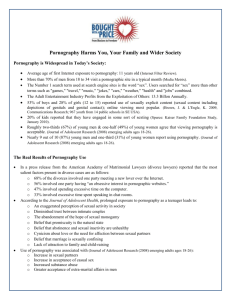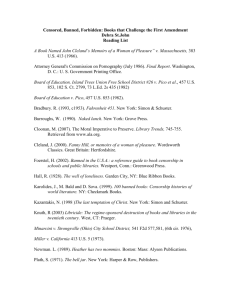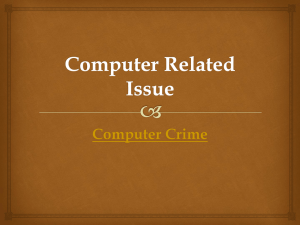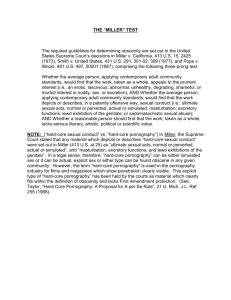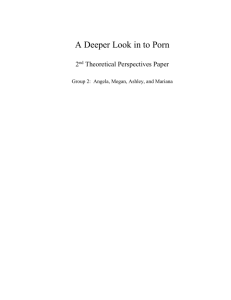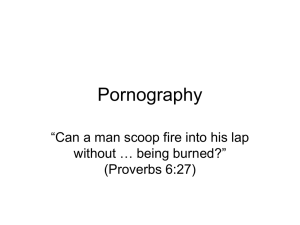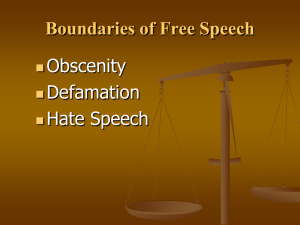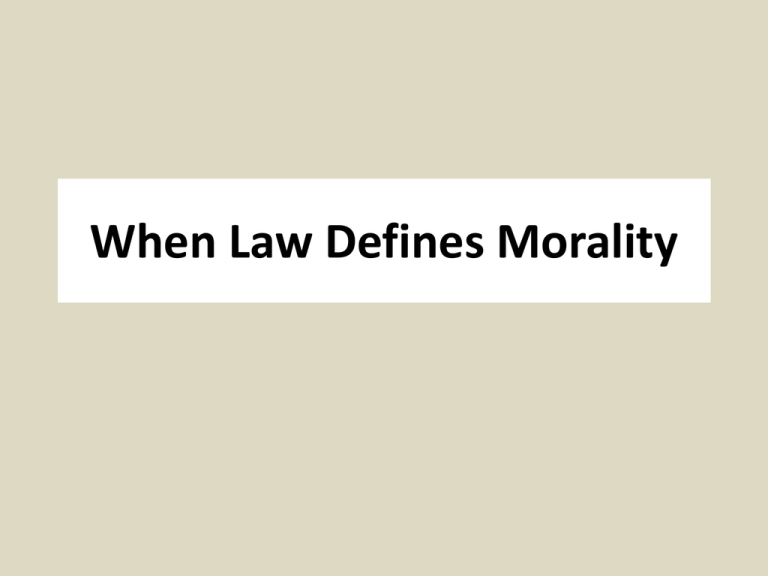
When Law Defines Morality
Mill, On Liberty, 200
Mill (1806 –1873): Philosopher of
science, ethics, economics; Member
of Parliament; officer of British East
Indies Company
Major feminist voice with wife Harriet
Taylor
Reworks utilitarianism of Bentham
South Florida Free Beaches v.
City of Miami, 199
South Florida Free Beaches, Inc
argued that the City’s ban on nudity
on its public beaches violates the
First Amendment right to free
speech (as freedom of expression)
Sodomy – A History
First considered under Church Law, becomes
part of English criminal law in 1533 as
capital offense
Only includes anal sex and bestiality until
late 19th Century, not applied to women
1610: Virginia institutes first American
sodomy law, capital punishment
1955: Model Penal Code delists sodomy
1961: Illinois decriminalizes sodomy
Bowers v. Hardwick (1986)
Georgia law criminalized sodomy
without regard to gender or marriage
Hardwick arrested for private,
consensual homosexual sodomy
Supreme Court majority recasts
question as whether there is “a
fundamental right [for] homosexuals
to engage in sodomy”
36 States Decriminalized Sodomy
before Lawrence v. Texas
Yellow <1970, Orange 1970-89, Peach 1990-2002
Lawrence v. Texas (2003),
A romantic partner of Tyrone Garner
(Eubanks) called in a “man with a
gun” to police. Police find Garner
engaged in anal sex w/ Lawrence.
Eubanks later serves two weeks for
a false police report.
Lawrence v. Texas (2003),
Texas "Homosexual Conduct“ Act
(Texas Penal Code, Chap. 21, Sec.
21.06) makes it a Class C
misdemeanor for anyone to "engage
in deviant sexual intercourse with
another individual of the same sex"
Devlin, “The Enforcement of Morals,”
202
Baron Devlin (1905-1992): Roman
Catholic English lawyer & trial judge,
later a “Law Lord”
Writes “Enforcement of Morals” in
response to Wolfenden Report (1965),
that recommended decriminalizing
homosexual acts in England (occurred
in 1967)
Hart, Law, Liberty and Morality, 207
Hart was Professor of Jurisprudence
at Oxford
Hart was bisexual and had an open
marriage – his wife was intimate w/
Isaiah Berlin
Dworkin, “Devlin was Right,” 209
Gerald Dworkin, Professor of
Philosophy at the University of
California, Davis (no relation to
Ronald)
Definitions
Obscenity - from Latin, obscenus - not said.
Beyond First Amendment protection.
Obscenity includes pornography, but also
includes blasphemy and profanity.
Pornography - from Greek pornographos writing about prostitutes. Material whose
primary purpose is to cause sexual
arousal; not all pornography is obscene.
Obscenity Originally
Restricted to Blasphemy
First known pornography prosecution,
Rex v. Read (England, 1708) involved
author of The Fifteen Plagues of a
Maidenhead
Acquitted. Court found book "bawdy
stuff," but not criminal because it did
not libel either the King or Religion.
Obscenity Originally
Restricted to Blasphemy
First known successful pornography
prosecution, Rex v. Curl (England,
1727) involved author of Venus in her
Cloister, or the Nun in her Smock
Court found Curl guilty of “offence to
religion” as the action involved clergy
in sexual situations that mocked
religious rituals.
Obscenity Originally
Restricted to Blasphemy
Massachusetts had only colonial statute
condemning what today might be
called pornography, but law required
works be “in imitation of preaching or
any other part of divine worship.”
Changes law in 1835 to replace religious
requirement with “tending to
corruption of the morals of youth.”
People v. Boomer, 271
Boomer is canoeing and tips over, swears
loudly as he enters cold water
Michigan law states that:
Any person who shall use any indecent,
immoral, obscene, vulgar or insulting
language in the presence or hearing of
any woman or child shall be guilty of a
misdemeanor.
Porn, Porn, Everywhere!
Arguments against Pornography
Porn focuses on body, not complete person
Sexual gratification outside marriage is
wrong (or illegal)
Pornography undermines gender equality
Pornography increases sex crimes and/or
reduces sympathy for victims
Porn contributes to a more vulgar society
Porn harms “performers”
Arguments against Censorship
Pornography is a harmless outlet for
exploring sexual fantasies
No one has moral authority to determine
what may be perverted or “prurient”
No proof that pornography increases sex
crimes
Problem of defining pornography to include
sexual discourse serving other values
Feinberg, “Obscenity as
Pornography,” 241
Joel Feinberg, 1926-2004, philosopher
at Princeton (later at U of Arizona)
Question: Is it consonant with liberal
principles (only prohibit that which
causes harm) to ban pornography?
American Booksellers Assn v. Hudnut, 237
Indianapolis ordinance results from
alliance between radical feminists
and Christian conservatives
Prohibits pornography in which
women are shown as weak,
submissive, or enjoying pain


